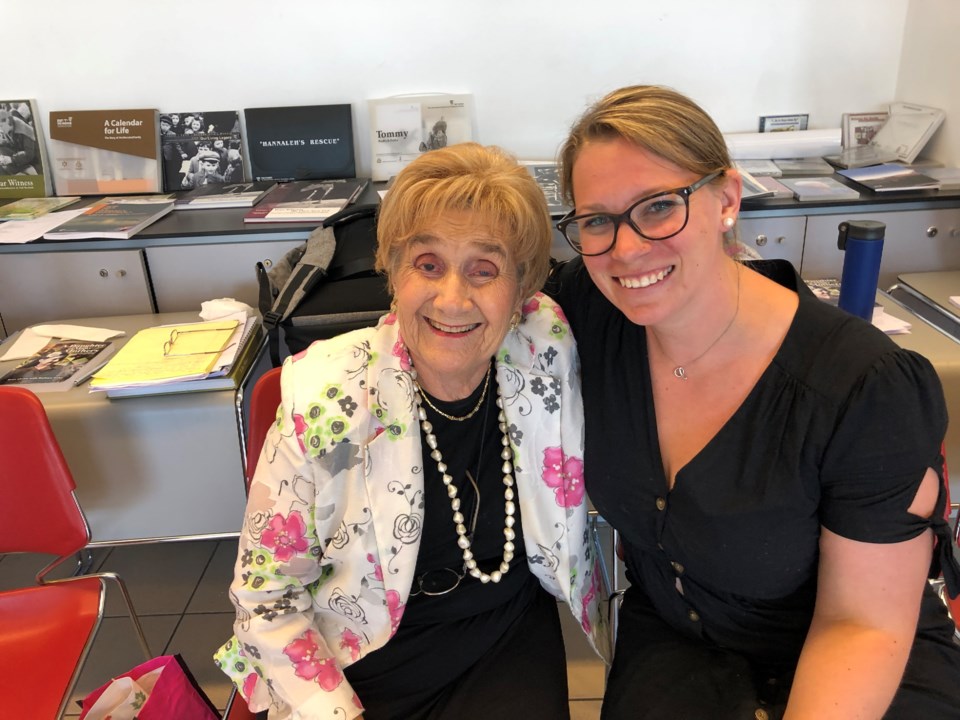A North Bay teacher is applauding Ontario's introduction of new and expanded mandatory learning in schools about the Holocaust.
Anna Pearson is a grade six teacher at Sunset Park School and says the move is very timely given the rise of antisemitism, not only in Canada but in the world right now.
According to a 2021 survey on antisemitism and Holocaust knowledge conducted by Liberation75, one in three teens in Canada think the Holocaust was fabricated, exaggerated, or are unsure it actually happened.
"And now we're in 2023, and the rise of antisemitism is insane," Pearson told BayToday. "The rise of antisemitic incidents, not only in Toronto area and Ontario but even here in the north, has risen and actually, they're among the highest rates of hate ever recorded in Canada. Mandatory Holocaust education is just so important right now."
Pearson points to the disturbing incident at École secondaire catholique Algonquin just two years ago when a video surfaced showing a group of grade 8 students marching together on school property while holding up their arms in the Nazi salute.
See: Grade 8 hate speech video prompts police investigation at local school
And: Board says antisemitic schoolyard video was part of 'TikTok challenge'
"So I think given this data we have, it's just so important that we build the curriculum. There is already teaching of the Holocaust, however, now it will be more specific, so they'd be looking more at the extreme political ideology, including fascism and antisemitism in Canada in the 1930s and 40s from the Canadian perspective versus the way we learn about the Holocaust and antisemitism in Europe. So having this perspective in the Canadian history course is really important I think."
Pearson feels social media has had a big impact on hate speech because students are learning about the Holocaust there, which is a problem.
"In some ways, it is concerning that that's where they're getting their information. So, that's why I think when that study was conducted in 2021, a lot of students believed that either the Holocaust was fabricated or that it was exaggerated or they're not exactly sure what happened."
The war in the Middle East has only made things worse.
"Students are seeing all these perspectives and antisemitic videos coming from that war, and they're being privy to it. I need to say no. This is the message we need, to be critically thinking about what these people are saying, and this is antisemitism. We need to address it. They need to be able to recognize it, and I think that comes from my grade sixes who are 11 and 12 all the way up. I think that students need to have those critical thinking skills to be able to say, 'No, that's anti-Semitism. We need to stop that.'"
It's something she is very passionate about, so much so that she was actually on the team that helped write the new curriculum. There's also going to be a new additional qualification course that teachers can take accredited by the Ontario College of Teachers and it's called Holocaust Education and Countering Antisemitism.
"Teachers could take this course and they'll be able to learn about the same kind of things that I learned about when I was in Israel and how to teach it age-appropriately. How do you approach teaching the Holocaust? What things to talk about? What things do we need to focus on?
In 2019, Pearson, a French Immersion teacher at Sunset Park travelled to Jerusalem, Israel to attend the Holocaust Studies program for educators at Yad Vashem, the World’s Holocaust Remembrance Center.
Her goal was to discover significant research and pedagogical materials in Holocaust education and hear first-hand, experiences from Holocaust survivors.
She said she was excited about new opportunities to teach the next generation of Canadians about the Holocaust to promote tolerance and inclusion and help students realize the importance of speaking up and speaking out.
See: Learning and teaching about the Holocaust
Pearson says that experience led her to re-evaluate how she approached the teaching of the Holocaust for her own junior-level students, how to teach the Holocaust appropriately, and how to address difficult topics.
"We looked at the specific content that we could cover making sure that we are supporting our students by learning about these difficult topics such as the Holocaust,"
Every year Pearson brings a Holocaust survivor into her classroom to speak about their experiences to students. They talk about the Holocaust and also talk about how the rise of antisemitism is one of the reasons why survivors continue to stand up and speak about their experiences.
"My students are very interested. One of the biggest things that I always do when I teach the Holocaust is, I translate numbers into individuals, and my students need to see that. These were people. They were Jewish people. They had lives. They had families. They had passions. They had things they liked...sports and music. They had all of these different things and they were specifically targeted because they were Jews. So when a survivor comes and speaks to them, it makes the experience real for them, and they understand that, yes, this is a person. This is a person who has these experiences, and it gives a voice to those numbers."



